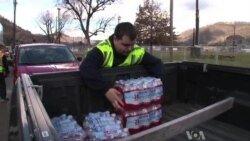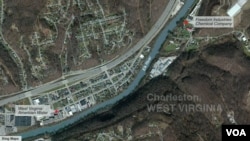CHARLЕSTON —
In the U.S. state of West Virginia, a major chemical spill that contaminated a river supplying water to hundreds of thousands of people is slowly dissipating. Officials say the water restrictions have been lifted in some areas near the state capital of Charleston. But in some rural towns people still cannot drink the local water.
In the town of Marmet, which is just south of Charleston, residents line up in the their cars for free bottled water. Schools and most restaurants and businesses remain closed.
Marmet's Fire Chief Jerry McGhee says responding to the water emergency has brought out the best in the community.
“The fire department and a ton of volunteers, which we really appreciate coming out. The police department, local police department has been here. We had city council personnel with us and just a lot of in-town folks who have chipped in to assist us,” says McGhee.
This crisis began when a chemical known as MCHM, used to clean impurities from coal, leaked from a storage tank owned by a company called Freedom Industries. The chemical got into the Elk River, which supplies drinking water to the region. Residents say the contaminated water smells like licorice. Officials warned people not to drink it, or even wash with it.
Dustin White with the Ohio Valley Environmental Coalition and other environmental activists are critical of what they say is the lack of regulation of the powerful chemical and coal industries in West Virginia. But for now they are focusing on the crisis at hand, bringing water to rural areas.
“For me and a lot of us, this is where we call home. So any time that our people need any type of help, we try to respond in any way we can to help the people who need it,” says White.
Tommy Manns and many local residents say with some help they can survive this crisis.
“It's not as bad as what people make it seem, but you know we get by. All the water everybody gives out helps a lot,” says Manns.
Officials say it could be several days before the water-use ban is lifted entirely.
In the town of Marmet, which is just south of Charleston, residents line up in the their cars for free bottled water. Schools and most restaurants and businesses remain closed.
Marmet's Fire Chief Jerry McGhee says responding to the water emergency has brought out the best in the community.
“The fire department and a ton of volunteers, which we really appreciate coming out. The police department, local police department has been here. We had city council personnel with us and just a lot of in-town folks who have chipped in to assist us,” says McGhee.
This crisis began when a chemical known as MCHM, used to clean impurities from coal, leaked from a storage tank owned by a company called Freedom Industries. The chemical got into the Elk River, which supplies drinking water to the region. Residents say the contaminated water smells like licorice. Officials warned people not to drink it, or even wash with it.
Dustin White with the Ohio Valley Environmental Coalition and other environmental activists are critical of what they say is the lack of regulation of the powerful chemical and coal industries in West Virginia. But for now they are focusing on the crisis at hand, bringing water to rural areas.
“For me and a lot of us, this is where we call home. So any time that our people need any type of help, we try to respond in any way we can to help the people who need it,” says White.
Tommy Manns and many local residents say with some help they can survive this crisis.
“It's not as bad as what people make it seem, but you know we get by. All the water everybody gives out helps a lot,” says Manns.
Officials say it could be several days before the water-use ban is lifted entirely.







